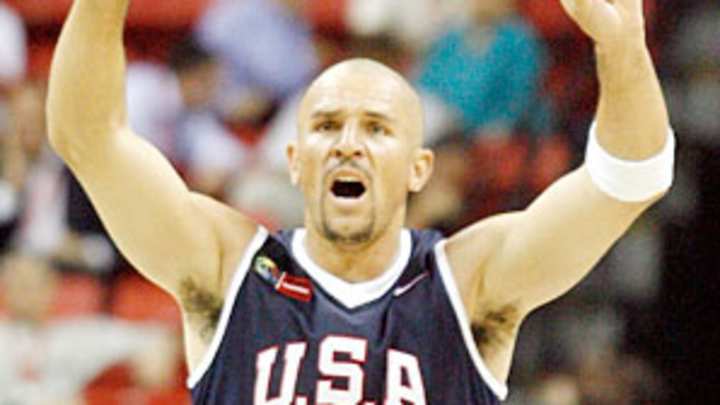Beijing Olympics are high stakes for the USA Basketball program

In need of one firm, stabilizing voice, Colangelo was handed complete authority over all Team USA matters. And he exercised it frequently. With an eye toward the 2008 Olympics, Colangelo demanded a three-year commitment from any player desiring to wear the USA uniform. He hired Duke's Mike Krzyzewski as the first college coach of USA Basketball since NBA players began participating in international competition in 1992. And he cast aside the notion that an American lineup should be composed entirely of NBA All-Stars, preferring to fill out the roster with role players -- albeit talented ones -- who fit the team's needs.
Today, Colangelo is just weeks away from discovering whether his plan will yield results. Injuries and other circumstance have prevented many from making the required three-year commitment -- only three players on the current roster (Carmelo Anthony, Dwight Howard and LeBron James) played for the U.S. team in the 2006 World Championships and the 2007 FIBA Americas tournament -- and the Americans have experienced their share of growing pains in international competitions. It all adds up to a mountain of uncertainty as the United States prepares to attempt to regain its status as the world's top basketball country.
"It seems like only weeks ago that I met with Carmelo Anthony," Colangelo said at the start of the Stateside portion of Team USA's training camp, which culminates here with Friday's exhibition game against Canada. "He was the first player I met with and that was in December of 2005. Back then, 2008 seemed like a long way off. But here we are. My adrenaline is flowing. Of all the things that have happened in my life, this is potentially the crowning moment for me. This is the moment I've been waiting for."
How much is riding on next month's Beijing Olympics? Possibly the future direction of USA Basketball. No U.S. officials would admit it, but while a gold medal would likely ensure that the team continues in the current direction -- that is, headlined by NBA players -- anything less could lead to the complete overhaul of the program.
"I'd like to believe that we have put the infrastructure in place for this to last a long time," Colangelo said. "It wasn't just a three-year deal. The younger players all want to play. Everybody wants to participate."
But will USA Basketball want them? Colangelo's commitment to the team ends after the Olympics, and he said he will not decide on his future until then. A poor finish, however unlikely, could lead to a shift in philosophy, one that could include the return of college players or the recruitment of a younger team that would be less talented but could spend more time practicing and playing together. Because when it comes to international basketball, continuity is a tremendous advantage.
The players themselves acknowledge that expectations this year are especially high.
"There is pressure to win," Kobe Bryant said. "But it comes with the territory. Everybody is used to dealing with it. We thrive off of that."
Jason Kidd refused to even acknowledge the possibility that a poor finish in China could lead to a restructuring of USA Basketball.
"We're not going to lose," said Kidd, who is 38-0 in international competition.
Of course not. But just to play devil's advocate ...
"Nope," said Kidd. "We're not going to lose."

Chris Mannix is a senior writer at Sports Illustrated covering the NBA and boxing beats. He joined the SI staff in 2003 following his graduation from Boston College. Mannix is the host of SI's "Open Floor" podcast and serves as a ringside analyst and reporter for DAZN Boxing. He is also a frequent contributor to NBC Sports Boston as an NBA analyst. A nominee for National Sportswriter of the Year in 2022, Mannix has won writing awards from the Boxing Writers Association of America and the Pro Basketball Writers Association, and is a longtime member of both organizations.
Follow sichrismannix